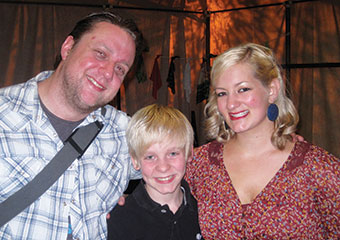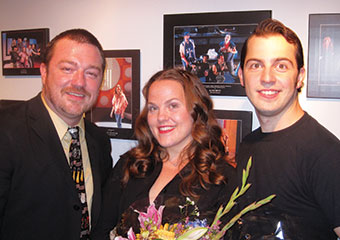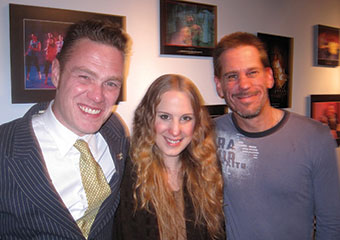Next story: Judge Not, David Manz, Lest Ye Be Unjudged
It's a Fine Life
by Anthony Chase

Depression-era Oliver! at MusicalFare
The current MusicalFare production of Oliver!, Lionel Bart’s 1960 musical retelling of Charles Dickens’ Oliver Twist, is nothing like the gloriously oversized Oscar-winning movie version from 1968. Neither will it resemble any of countless high school and community theater productions or any other version you may have seen. Director Chris Kelly has relocated the show, originally set in Victorian England, to America during the Great Depression, and has downsized the proceedings to handmade, human proportions. Not only that, he has accomplished this by coupling some of Buffalo’s most appealing performers to play Dickens’ familiar characters: among them, Amy Jakiel as Nancy, Brian Riggs as Fagin, Cassie Gorniewicz as the Artful Dodger, Eric Michael Rawski as nasty Bill Sykes—and the talents of just one single, albeit angel-faced and silver-throated child, Adam Kluge.
This idea may sound nuts, but it actually works.
In Kelly’s vision, an encampment of homeless people in 1933 entertain themselves by reading aloud from Dickens’ novel as they act out the action, accompanied by their own acoustic instruments. Kelly has added a narrator (Brandon Barry), who begins the performance by reading Dickens’ own sadly comical account of the birth of Oliver Twist. This strategy introduces Kelly’s meta-theatrical device as well as Dickens’ masterful melding of melodramatic sentiment, horror, and comedy.
Chris Kelly is best known as an actor of substantial power and a director who developed and honed his imagination and craft at Buffalo United Artists. At BUA, he was the inspired mind behind delightfully daft re-conceptions of The Bad Seed, Rebecca, Dracula, and Salome. These shows were notable for flights of comic fancy sent aloft on little more than a stage, four wooden cubes, and often the cross-dressing genius of actor Jimmy Janowski.
Kelly is also, by no small coincidence, a protégé of Buffalo State’s Ann Colley, a SUNY Distinguished Professor and global authority on Victorian literature. By relocating the story from Victorian England to the Great Depression in America, Kelly has actually managed to recapture more of the spirit of Dickens’ Oliver Twist than I have ever seen in a production of this show.
Oliver Twist is the story of a boy who is orphaned at birth and raised in a deplorable Victorian workhouse. Oliver is sold to an undertaker whose wife despises the boy, but he eventually escapes and makes his way to London. Here, he encounters the Artful Dodger, another orphan who makes his living as a pickpocket. Dodger leads Oliver to Fagin, a strange old man who takes the boy in and makes him a part of his family of juvenile thieves.
The 1960 musical departs from Dickens in notable ways. In the novel, Fagin is the unsavory Victorian stereotype of the miserly Jew, and has a decidedly cruel streak. Fagin holds little true affection for the children he recruits to thieve for him. The musical, by contrast, focuses on Fagin’s comic attributes to create an endearing and avuncular, if eccentric, figure, protective of the boys, and a buffer between his improvised family and dangerously violent Bill Sykes. Whereas Dickens sends Fagin to his execution by hanging, the musical ends with Fagin and the Artful Dodger joyfully strolling into the distance arm in arm.
There are other departures from Dickens’ sprawling novel. Gone is a litany of secondary characters, including Oliver’s despicable half-brother, Monks. Other actions and locations are condensed
There are ways, however, in which the musical is entirely faithful to Dickens, particularly in its depiction of the hunger and desperation that accompanied Victorian poverty, as well as its intermingling of comic and serious moments.
Kelly’s direction emphasizes these aspects of the musical. Images of homeless people working together to survive in a shantytown by sharing food, comfort, and the spoils of petty crime provide palpable parallels to the family of Dickensian castaways contrived by Fagin and his gang. Bill Sykes’ girlfriend, Nancy, who becomes a maternal figure to Oliver, and her friend, Bet, are costumed by Kari Drozd to look like 1930s tarts, thereby transforming them into convincing descendents of their street-walking Victorian predecessors. Bill Sykes is not so very far removed from the wanton criminals of the Depression, a time when murderous thugs were glamorized and turned into folk heroes.
This was also the decade when Woody Guthrie wrote and performed the tunes that would become Dust Bowl Ballads. Working with musical director, Joe Donohue III of local original indie rock bandthe Albrights, the production re-conceives the original orchestration and thereby the tone of Lionel Bart’s famously exuberant score. The sound and “Hard Times” spirit of the Albrights is winningly compatible with a show that tells us, “If you don’t mind having to do without things, it’s a fine life!” and Mr. Donohue personally provides some of the evening’s most affecting vocals. Fellow Albrights Brandon Barry and Matthew Crane similarly leap into the spirit of the enterprise with talent and enthusiasm.
Opening Shots
Oliver! at MusicalFare in Snyder



Top: Eric Rawski, who plays evil Bill Sykes, with golden-throated Adam Kluge, who plays Oliver Twist, and charismatic Amy Jakiel, who stars as Nancy. Middle: Choreographer Bobby Cooke with Jenn Stafford, who plays the Widow Corney and Bet, and John Kaczorowski, who plays creepy undertaker Mr. Sowerberry and gentlemanly Mr. Brownlow. Bottom: Director Chris Kelly with Cassie Gorniewicz, who plays the Artful Dodger, and Brian Riggs, who plays Fagin.
High-spirited and joyfully oversized, Oliver! becomes an intimate and sometimes quiet tale of the triumph of love over dire poverty. The usually upbeat and cheerful opening number, “Food, Glorious Food,” originally sung by boisterous workhouse orphans, is here rendered as a plaintive and hushed ballad solo in American folk style, emphasizing the hunger that inspires the culinary fantasy.
Indeed, at MusicalFare, the popular culture of the Depression era helps amplify Lionel Bart’s musicalization of the Oliver Twist story at every turn. Marathon dances, faith healer shows and Christian revival meetings, torch singers from the golden age of radio, Appalachian folk music, and bootleg booze—all serve to remind an affluent suburban audience in 21st-century Buffalo that poverty is timeless, and so too is human compassion. The performance, in its depiction of people banding together to overcome adversity, becomes a metaphor for the life-affirming value of theater itself, a medium that brings communities together to celebrate the struggles and triumphs of humanity.
Kelly has amplified the humorous elements of the script in a manner consistent with a novel that even manages to find comedy in infant mortality, and that names an undertaker “Sowerberry,” a beadle “Bumble,” and a charming pickpocket “Dodger.” (The great clown, Barry Humphries, better known today by the name of his drag creation, Dame Edna Everage, made his West End debut as Mr. Sowerberry.) For Dickens, there was often something sad about the things that make us laugh—though that is probably not what Oscar Wilde meant when he opined that one would have to have a heart of stone not to laugh when reading about the death of Little Nell in Dickens’ The Old Curiosity Shop.
Vital to the realization of his concept, the director has surrounded himself with formidable talent to conjure the Oliver! story.
Amy Jakiel projects a steady and loving presence as Nancy, alternately imbuing her songs with emotional heights (“Oom-Pah-Pah”) or depths (“As Long As He Needs Me”), or a combination of the two (“It’s a Fine Life.”)
Brian Riggs is the very embodiment of the iconic Fagin, lending the character precisely the comic grotesqueness that defines the “Dickensian.” He strongly renders “Pick a Pocket or Two” and “Reviewing the Situation.
Cassie Gorniewicz is delightful as the Artful Dodger, bringing lithe grace and impish charm to the character, and precision and impressive clarity of interpretation to every lyric. Eric Michael Rawski is the delicious personification of evil and a terrifying presence as Bill Sykes.
The production ventures into the minor characters with outrageous playfulness. John N. Kaczorowski clowns hilariously as undertaker Sowerberry, enabling him to make a total transformation as Oliver’s savior, upper-class Mr. Brownlow. Megan Callahan clearly takes her inspiration from the same melodramatic funny bone as Mrs. Sowerberry. Philip Farugia’s Mr. Bumble is a pompously comic horror from his first declaration that Oliver is an ingrate to his final declaration that any law that assumes women defer to their husbands is an ass. Jenn Stafford leaps into the fray with over-the-top realizations of concupiscent Widow Corney and Nancy’s devoted life-loving friend, Bet.
Young Adam Kluge is entirely endearing as Oliver Twist. The flaxen-haired child possesses a soaring voice, and the production wryly allows the lad to become an American boy when he riffs into some distinctly New World (and crowd-pleasing) musical improvisations on the score.
Bobby Cooke’s choreography is sharp and amusing. Chris Schenk’s set is perfect in its minimalism, and handsomely offsets Ms. Drozd’s 1930s vintage costumes and hairstyles. Fight choreography by Adam Rath is dramatic, exciting, and sometimes frightening, as (spoiler alert) in the scene of Nancy’s murder.
There are instances when the production could use fine-tuning. During their solos, Nancy and Fagin would be better served, in terms of power and focus, if they would simply plant themselves and sing. Instead, they are sent to wander the stage, diffusing the moments with fuzzy actorly and choreographic indulgence. There are times, as well, when the concept of the show cannot be sustained with the vocal talent at hand; and no one at the auditions seems to have asked if anyone could actually whistle. These amount minor quibbles, however, in an evening that is entertaining, uplifting, illuminating, and memorable. Oliver! further solidifies MusicalFare’s reputation as Western New York’s finest, most consistent, and most energetic producer of musicals.
|
Issue Navigation> Issue Index > v10n37 (Week of Thursday, September 15) > It's a Fine Life This Week's Issue • Artvoice Daily • Artvoice TV • Events Calendar • Classifieds |









 Current Issue
Current Issue